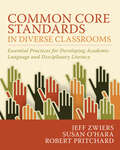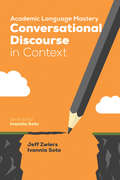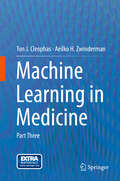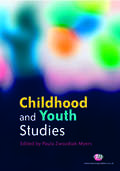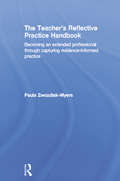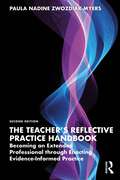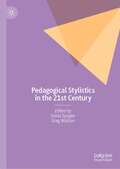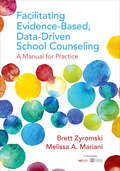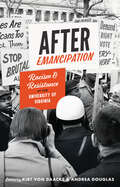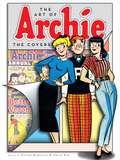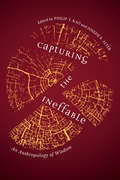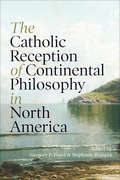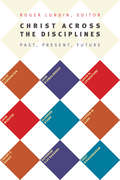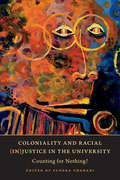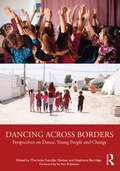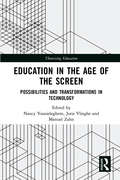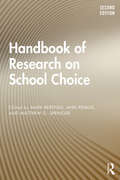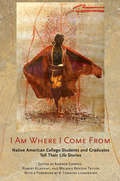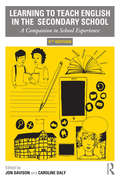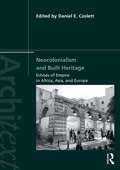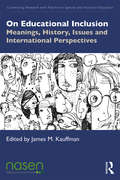- Table View
- List View
Common Core Standards in Diverse Classrooms: Essential Practices for Developing Academic Language and Disciplinary Literacy
by Jeff Zwiers Susan O'Hara Robert PritchardThe Common Core State Standards require students to do more with knowledge and language than ever before. Rather than be mere consumers of knowledge, students must now become creators, critics, and communicators of ideas across disciplines. Yet in order to take on these new and exciting roles, many students need daily teaching with an extra emphasis on accelerating their academic communication skills. Common Core Standards in Diverse Classrooms: Essential Practices for Developing Academic Language and Disciplinary Literacy describes seven research-based teaching practices for developing complex language and literacy skills across grade levels and disciplines: using complex texts, fortifying complex output, fostering academic interaction, clarifying complex language, modeling, guiding, and designing instruction. Most important, you will find clear descriptions and examples of how these essential practices can-;and should-;be woven together in real lessons. The book: Clarifieshow to support the learning of complex language that students need for reaching Common Core and other standardsProvides practical ways to realize the instructional shifts needed with the implementation of new standards in diverse classroomsIncludes frameworks and descriptions on how to develop students' complex language, speaking, and writingHelps maximize strategies and tools for building system-wide capacity for sustained growth in the practicesCommon Core Standards in Diverse Classrooms is a concise guide for helping us improve our practices to strengthen two vital pillars that support student learning: academic language and disciplinary literacy.
Academic Language Mastery: Conversational Discourse in Context
by Jeff Zwiers Ivannia M. SotoBy now it’s a given: if we’re to help our ELLs and SELs access the rigorous demands of today’s content standards, we must cultivate the “code” that drives school success: academic language. Look no further for assistance than this much-anticipated series from Ivannia Soto, in which she invites field authorities Jeff Zwiers, David and Yvonne Freeman, Margarita Calderon, and Noma LeMoine to share every teacher’s need-to-know strategies on the four essential components of academic language. The subject of this volume is conversational discourse. Here, Jeff Zwiers reveals the power of academic conversation in helping students develop language, clarify concepts, comprehend complex texts, and fortify thinking and relational skills. With this book as your roadmap, you’ll learn how to: Foster the skills and language students must develop for productive interactions Implement strategies for scaffolding paired conversations Assess student’s oral language development as you go It’s imperative that our ELLs and SELs practice academic language in rich conversations with others in school, especially when our classrooms may be their only opportunities to receive modeling, scaffolding, and feedback focused on effective discourse. This book, in concert with the other three volumes in the series, can provide both a foundation and a framework for accelerating the learning of diverse students across grade levels and disciplines.
Academic Language Mastery: Conversational Discourse in Context
by Jeff Zwiers Ivannia M. SotoBy now it’s a given: if we’re to help our ELLs and SELs access the rigorous demands of today’s content standards, we must cultivate the “code” that drives school success: academic language. Look no further for assistance than this much-anticipated series from Ivannia Soto, in which she invites field authorities Jeff Zwiers, David and Yvonne Freeman, Margarita Calderon, and Noma LeMoine to share every teacher’s need-to-know strategies on the four essential components of academic language. The subject of this volume is conversational discourse. Here, Jeff Zwiers reveals the power of academic conversation in helping students develop language, clarify concepts, comprehend complex texts, and fortify thinking and relational skills. With this book as your roadmap, you’ll learn how to: Foster the skills and language students must develop for productive interactions Implement strategies for scaffolding paired conversations Assess student’s oral language development as you go It’s imperative that our ELLs and SELs practice academic language in rich conversations with others in school, especially when our classrooms may be their only opportunities to receive modeling, scaffolding, and feedback focused on effective discourse. This book, in concert with the other three volumes in the series, can provide both a foundation and a framework for accelerating the learning of diverse students across grade levels and disciplines.
Machine Learning in Medicine
by Aeilko H. Zwinderman Ton J. CleophasMachine learning is a novel discipline concerned with the analysis of large and multiple variables data. It involves computationally intensive methods, like factor analysis, cluster analysis, and discriminant analysis. It is currently mainly the domain of computer scientists, and is already commonly used in social sciences, marketing research, operational research and applied sciences. It is virtually unused in clinical research. This is probably due to the traditional belief of clinicians in clinical trials where multiple variables are equally balanced by the randomization process and are not further taken into account. In contrast, modern computer data files often involve hundreds of variables like genes and other laboratory values, and computationally intensive methods are required. This book was written as a hand-hold presentation accessible to clinicians, and as a must-read publication for those new to the methods.
Childhood and Youth Studies
by Paula Zwozdiak-MayersThis book introduces the inter-disciplinary study of childhood and youth, and the multi-agency practice of professionals who serve the needs of children, young people, and their families. Exploring key theories and central ideas, research methodology, policy, and practice, the book takes a holistic, contextual approach that values difference and diversity — for example, investigating concepts such as identity, representation, creativity and discourse, and issues such as ethnicity, gender, and the 'childhood in crisis' thesis. Further, it challenges opinion by exploring complex and controversial modern-day issues, and by engaging with a range of perspectives to highlight debates.
The Teacher's Reflective Practice Handbook: Becoming an Extended Professional through Capturing Evidence-Informed Practice
by Paula Zwozdiak-MyersWhat do we mean by reflective practice? What does it involve? How can it help you develop as a teacher? The Teacher’s Reflective Practice Handbook is an essential source of advice, guidance and ideas for both student and practising teachers. Helping you to translate pedagogical knowledge into practice, this Handbook guides you through studying your own teaching for personal development, evaluating your lessons through classroom research, and enhancing the quality of pupil learning. It offers an innovative framework which serves to prepare you for the challenges and complexities of the classroom environment, and supports the continuing improvement of your teaching. Underpinned by key theoretical concepts and contemporary research within the field of education, chapters help you to: systematically evaluate your teaching through classroom research procedures question personal theories and beliefs, and consider alternative perspectives and possibilities try out new strategies and ideas to maximise the learning potential of all students enhance the quality of, and continue to improve, your teaching. Including a range of reflective tasks, links to online resources, exemplification material and further reading to help you develop your own thinking, The Teacher’s Reflective Practice Handbook is an accessible guide which supports the facilitation of reflective practice through self and peer assessment, problem-based learning and personal development planning. The multi-dimensional framework enables you to build a meaningful, personally relevant portfolio of evidence-informed practice.
The Teacher's Reflective Practice Handbook: Becoming an Extended Professional through Enacting Evidence-Informed Practice
by Paula Nadine Zwozdiak-MyersThe Teacher’s Reflective Practice Handbook is based on a multi-dimensional framework of reflective practice designed by the author to guide and support student, early career and experienced teachers to develop high-quality teaching and maximise pupil learning. This second edition combines the intent to preserve the integrity of seminal contributions advanced by eminent scholars and practitioners over the years, with that of broadening its reach to reflect key changes in policy discourse, teacher education, school and curriculum reform underpinned by evidence-informed research on what constitutes effective teaching and learning, across the national and international landscape. Chapters invite you to engage in descriptive, comparative and critical reflective conversations across nine dimensions of reflective practice which enables you to: Question personal theories, beliefs and assumptions about teaching and consider alternative perspectives and possibilities Systematically evaluate your own teaching through classroom research procedures Try out new strategies and ideas to appropriate new knowledge and to tailor inclusive provision for all your learners Enhance the quality of and continue to improve your own teaching Including a range of reflective tasks, links to online resources, exemplification material and further reading to develop and challenge your own thinking, The Teacher’s Reflective Practice Handbook is an essential and accessible guide which supports the enactment of reflective practice through self- and peer-assessment, solution-focused learning, professional development and improvement planning to build a meaningful portfolio of evidence-informed practice.
Pedagogical Stylistics in the 21st Century
by Sonia Zyngier Greg WatsonThis edited book provides cutting edge contributions from an international array of prominent experts who discuss the relevance of pedagogical stylistics in relation to diverse contexts and areas, including empirical approaches, corpus stylistics, creative writing, literary-linguistic criticism, students as researchers, critical discourse, academic register, text-world pedagogy, cognitive stylistics, classroom discourse, language of literary texts, L1/L2 education, EFL learners, and multimodal stylistics. Intended as a follow-up to Watson and Zyngier (2007), this volume situates the reader by offering a broad assessment of how the field has developed during the past 15 years and where it stands now. By examining both contemporary research and future challenges, it should be regarded as essential reading for all teachers, researchers, scholars, and students interested in understanding language and how to apply stylistics in educational settings. This book will be of interest to students and scholars working in stylistics, cognitive linguistics, language teaching, applied linguistics, literary studies, and materials development.
Facilitating Evidence-Based, Data-Driven School Counseling: A Manual for Practice
by Brett Zyromski Melissa A. MarianiCounselors make a difference—and now you can prove it. Your counseling makes a difference in the lives of at-risk students every day. To meet accountability standards, though, you need data the number-crunchers can understand. With this user-friendly manual, make the shift to evidence-based practices and interventions in a data-driven, comprehensive school counseling program based on ASCA’s national model. The book includes Visual guides and checklists for every step of the process Examples of successful program evolution Guidance on developing and submitting a successful Recognized ASCA Model Program (RAMP) application Supporting documents in an online resource center
Facilitating Evidence-Based, Data-Driven School Counseling: A Manual for Practice
by Brett Zyromski Melissa A. MarianiCounselors make a difference—and now you can prove it. Your counseling makes a difference in the lives of at-risk students every day. To meet accountability standards, though, you need data the number-crunchers can understand. With this user-friendly manual, make the shift to evidence-based practices and interventions in a data-driven, comprehensive school counseling program based on ASCA’s national model. The book includes Visual guides and checklists for every step of the process Examples of successful program evolution Guidance on developing and submitting a successful Recognized ASCA Model Program (RAMP) application Supporting documents in an online resource center
After Emancipation: Racism and Resistance at the University of Virginia (The American South Series)
Assessing a university&’s legacy in the age of segregation This anthology reckons with the University of Virginia&’s post-emancipation history of racial exploitation. Its fifteen essays highlight the many forms of marginalization and domination at Virginia&’s once all-white flagship university to uncover the patriarchal, nativist, and elitist assumptions that shaped university culture through the late nineteenth century and well into the twentieth. Including community responses ranging from personal reflections to interviews with local leaders to poems, this accessible volume will be essential reading for anyone with ties to UVA or to Charlottesville, as well as for anyone concerned with the legacy of slavery and segregation in America&’s universities.
The Art of Archie: The Covers (The Art of Archie)
Archie's new hardcover art book is a beautifully-designed celebration of over 70 years of comic book covers featuring America's reigning cartoon high school icons: Archie, Betty, Veronica and friends. Featuring beautiful full-color artwork by fan favorite artists Dan DeCarlo, Harry Lucey, Bob Montana, Dan Parent and many more in a deluxe, oversize hardcover edition, The Art of Archie: The Covers goes behind the scenes on the all-time best comic book covers in Archie's history with a look at their inspiration, creation and ongoing cultural legacy. The Art of Archie: The Covers is the perfect purchase for comic book fans, Americana buffs and pop culture aficionados of all sorts, brought to you by Victor Gorelick and Craig Yoe, the team behind the critically-acclaimed The Art of Betty and Veronica.
Capturing the Ineffable: An Anthropology of Wisdom
Grounded in ethnographic case studies that examine experiences from which wisdom emerges, Capturing the Ineffable provides a rigorous analysis of the sociocultural context of wisdom in the contemporary world. Each chapter in the volume deals with different aspects and showcases how communities in different contexts — nursing homes, religious organizations, corporations, and monastic institutions, for example — engage with the ineffability of wisdom. Contributors draw from a range of disciplines and cross-cultural and historical data in order to interpret the meaning and value of wisdom as a human endeavour. This book also represents an anthropological method for evaluating various philosophical and scientific approaches to understanding wisdom, including how wisdom is learned and taught. Readers will be able to appreciate how action, emotion, uncertainty, and cultural systems come to bear on wisdom as a value in human life and expression. In the end, Capturing the Ineffable reveals how the conception and paradoxical nature of wisdom dispels the dichotomies of self/other, structure/agency, known/unknown, nature/culture, and the like. What is at stake is a recasting of wisdom as a particular kind of anthropological endeavour and, thus, a return to and modification of philosophical anthropology.
The Catholic Reception of Continental Philosophy in North America
This volume by leading philosophers and theologians explores the reception of continental philosophy in North America and its ongoing relation to Catholic institutions. What has prompted so many North American Catholics to support this particular school of thought? Why do so many Catholics continue to find continental philosophy attractive, and why do so many continental philosophers work in Catholic departments? The establishment of the relationship between continental philosophy and Catholicism was not obvious, nor was it easy. Many of the contributors to this volume have played important roles in its development, and in these pages they take a stance on this evolving relationship and demonstrate that the engagement is far from over. Exploring the mutual interests that made this alliance possible as well as the underlying tensions, the volume provides, for the first time, an extended reflection on the historical, institutional, and intellectual relationship between Catholicism and continental philosophy on North American soil up to the present day.
Christ Across the Disciplines: Past, Present, Future
In Christ across the Disciplines a group of distinguished scholars from across the theological spectrum explores the dynamic relationship between the Christian faith and the life of the mind. Although the essays in this volume are rooted in a rich understanding of the past, they focus primarily on how Christian students, teachers, and scholars might best meet the challenges of intellectual and cultural life in a global world.This book ranges widely over the broad terrain of contemporary academic and cultural life, covering such topics as the enormous growth of political activism in late twentieth-century evangelicalism, the dynamics of literature and faith in the African-American experience, the dramatic implications of globalization for those who profess Christ and practice the life of the mind, and more!
Coloniality and Racial (In)Justice in the University: Counting for Nothing?
Coloniality and Racial (In)Justice in the University examines the disruption and remaking of the university at a moment in history when white supremacist politics have erupted across North America, as have anti-racist and anti-colonial movements. Situating the university at the heart of these momentous developments, this collection debunks the popular claim that the university is well on its way to overcoming its histories of racial exclusion Written by faculty and students located at various levels within the institutional hierarchy, this book demonstrates how the shadows of settler colonialism and racial division are reiterated in "newer" neoliberal practices. Drawing on critical race and Indigenous theory, the chapters challenge Eurocentric knowledge, institutional whiteness, and structural discrimination that are the bedrock of the institution. The authors also analyse their own experiences to show how Indigenous dispossession, racial violence, administrative prejudice, and imperialist militarization shape classroom interactions within the university.
Dancing Across Borders: Perspectives on Dance, Young People and Change
Dancing Across Borders presents formal and non-formal settings of dance education where initiatives in different countries transcend borders: cultural and national borders, subject borders, professional borders and socio-economic borders. It includes chapters featuring different theoretical perspectives on dance and cultural diversity, alongside case narratives that show these perspectives in a specific cultural setting. In this way, each section charts the processes, change and transformation in the lives of young people through dance. Key themes include how student learning is enhanced by cultural diversity, experiential teaching and learning involving social, cross-cultural and personal dimensions. This conceptually aligns with the current UNESCO protocols that accent empathy, creativity, cooperation, collaboration alongside skills- and knowledge-based learning in an endeavour to create civic mindedness and a more harmonious world. This volume is an invaluable resource for teachers, policy makers, artists and scholars interested in pedagogy, choreography, community dance practice, social and cultural studies, aesthetics and interdisciplinary arts. By understanding the impact of these cross-border collaborative initiatives, readers can better understand, promote and create new ways of thinking and working in the field of dance education for the benefit of new generations.
Discovering Algebra: An Investigative Approach, Lecciones condensadas en español Condensed Lessons in Spanish
NIMAC-sourced textbook
Education in the Age of the Screen: Possibilities and Transformations in Technology (Theorizing Education)
This edited volume brings together experts from across the field of education to explore how traditional pedagogic and didactic forms and processes are changing, or even disappearing, as a result of new technologies being used for education and learning. Considering the use, opportunites and limitations of technologies including interactive whiteboards, tablets, smart phones, search engines and social media platforms, chapters draw on primary and secondary research to illustrate the wide-reaching and often salient changes which new digital technologies are introducing into educational environments and learning practices around the world. Neither claiming that traditional forms of learning must be replaced, nor calling for a restoration of the school, Education in the Age of the Screen offers a nuanced exploration of the implications of digitization for education. Taking a broad view on education as a social and cultural phenomenon, the volume focuses on three major dimensions: the wider conditions against the background of which we educate and are educated today, detailed examples of aesthetic practices and educational initiatives in the current media culture, and concrete answers to the challenges that come our way. A comprehensive and timely consideration of the state of education in the digital age, this will be of interest to researchers, academics and post-graduate students in the fields of education and pedagogy, media and cultural studies, as well as teacher educators and trainee teachers.
Handbook of Research on School Choice
Updated to reflect the latest developments and increasing scope of school-based options, the second edition of the Handbook of Research on School Choice makes readily available the most rigorous and policy-relevant research on K–12 school choice. This comprehensive research handbook begins with scholarly overviews that explore historical, political, economic, legal, methodological, and international perspectives on school choice. In the following sections, experts examine the research and current state of common forms of school choice: charter schools, school vouchers, and magnet schools. The concluding section brings together perspectives on other key topics such as accountability, tax credit scholarships, parent decision-making, and marginalized students. With empirical perspectives on all aspects of this evolving sphere of education, this is a critical resource for researchers, faculty, and students interested in education policy, the politics of education, and educational leadership.
A History of the University in Europe
This is the final volume in a four-part series covering the development of the university in Europe (east and west) from its origins to the present day, focusing on a number of major themes viewed from a European perspective. The originality of the series lies in its comparative, interdisciplinary, collaborative and transnational nature. It deals also with the content of what was taught at the universities, but its main purpose is an appreciation of the role and structures of the universities as seen against a backdrop of changing conditions, ideas and values. This volume deals with the reconstruction and epoch-making expansion of higher education after 1945, which led to the triumph of modern science. It traces the development of the relationship between universities and national states, teachers and students, their ambitions and political activities. Special attention is paid to fundamental changes in the content of teaching at the universities.
I Am Where I Come From: Native American College Students and Graduates Tell Their Life Stories
"The organizing principle for this anthology is the common Native American heritage of its authors; and yet that thread proves to be the most tenuous of all, as the experience of indigeneity differs radically for each of them. While many experience a centripetal pull toward a cohesive Indian experience, the indications throughout these essays lean toward a richer, more illustrative panorama of difference. What tends to bind them together are not cultural practices or spiritual attitudes per se, but rather circumstances that have no exclusive province in Indian country: that is, first and foremost, poverty, and its attendant symptoms of violence, substance abuse, and both physical and mental illness.... Education plays a critical role in such lives: many of the authors recall adoring school as young people, as it constituted a place of escape and a rare opportunity to thrive.... While many of the writers do return to their tribal communities after graduation, ideas about 'home' become more malleable and complicated."—from the IntroductionI Am Where I Come From presents the autobiographies of thirteen Native American undergraduates and graduates of Dartmouth College, ten of them current and recent students. Twenty years ago, Cornell University Press published First Person, First Peoples: Native American College Graduates Tell Their Life Stories, also about the experiences of Native American students at Dartmouth College. I Am Where I Come From addresses similar themes and experiences, but it is very much a new book for a new generation of college students.Three of the essays from the earlier book are gathered into a section titled "Continuing Education," each followed by a shorter reflection from the author on his or her experience since writing the original essay. All three have changed jobs multiple times, returned to school for advanced degrees, started and increased their families, and, along the way, continuously revised and refined what it means to be Indian.The autobiographies contained in I Am Where I Come From explore issues of native identity, adjustment to the college environment, cultural and familial influences, and academic and career aspirations. The memoirs are notable for their eloquence and bravery.
Learning to Teach English in the Secondary School: A Companion to School Experience (Learning to Teach Subjects in the Secondary School Series)
Fully updated to reflect changes in teacher education and the curriculum, the Fifth Edition of Learning to Teach English in the Secondary School explores the background to debates about teaching the subject, alongside tasks, teaching ideas and further reading to expand upon issues and ideas raised in the book. Including chapters on planning, changes to the assessment system, language teaching, and cross-curricular aspects of secondary teaching, this new edition features: changes in policy and practice, including the most recent GCSE reforms; a new chapter on 'Media literacy in English'; a consideration of modern digital technology and how it underpins good practice in all areas of English teaching and learning; and cross-referencing to guidance on assessment and well-being and resilience in the core text Learning to Teach in the Secondary School. A key text for all student teachers, Learning to Teach English in the Secondary School combines theory and practice to present a comprehensive introduction to the opportunities and challenges of teaching English in the secondary school.
Neocolonialism and Built Heritage: Echoes of Empire in Africa, Asia, and Europe (Architext)
Architectural relics of nineteenth and twentieth-century colonialism dot cityscapes throughout our globalizing world, just as built traces of colonialism remain embedded within the urban fabric of many European capitals. Neocolonialism and Built Heritage addresses the sustained presence and influence of historic built environments and processes inherited from colonialism within the contemporary lives of cities in Africa, Asia, and Europe. Novel in their focused consideration of ways in which these built environments reinforce neocolonialist connections among former colonies and colonizers, states and international organizations, the volume’s case studies engage highly relevant issues such as historic preservation, heritage management, tourism, toponymy, and cultural imperialism. Interrogating the life of the past in the present, authors thus challenge readers to consider the roles played by a diversity of historic built environments in the ongoing asymmetrical balance of power and unequal distribution capital around the globe. They present buildings’ maintenance, management, reuse, and (re)interpretation, and in so doing they raise important questions, the ramifications of which transcend the specifics of the individual sites and architectural histories they present.
On Educational Inclusion: Meanings, History, Issues and International Perspectives (Connecting Research with Practice in Special and Inclusive Education)
Combining examination of policy with primary research and analysis of up-to-date literature, On Inclusive Education explores the various interpretations of inclusion, its history in education, and a range of its applications internationally. With an international complement of authors, this book features detailed yet accessible chapters on a range of topics, including inclusion in law; academically gifted students; students with severe, sensory, and multiple impairments; and case studies from Germany, Portugal, the Netherlands, and the Russian Federation. The book also examines the impact of the Convention on the Rights of Persons with Disabilities—and Article 24 in particular—and the likely legacies and future implications of recent inclusion movements. For postgraduate students and academics researching in the field of inclusive education, and also for school administrators and policy makers, On Inclusive Education is an essential resource.
